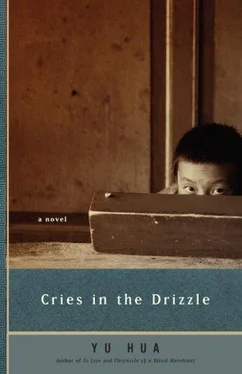After dinner that evening Wang Liqiang took my hand and we went for a long walk. Often he would exchange greetings with people he knew. I did not know that this would be my last stroll with Wang Liqiang, and I was enchanted by the glow of the setting sun as it lingered above the eaves. Infected by my boyish enthusiasm, Wang Liqiang talked a lot about when he was small. The thing he said that most stands out in my mind was that until he was fifteen he was so poor he often had no pants to wear. As he told me that he said with a sigh, “Being poor's not so bad; its other things that make you miserable.”
Later we sat down by the bridge. He studied me and said worriedly, “You're a little devil, aren't you?” Then he changed his tone. “You're a smart boy, that's for sure.”
That autumn when I was twelve, Liu Xiaoqing's big brother — the musician I so admired — died of hepatitis.
By then he was no longer an idle teenager, for after graduation from high school he had been sent off to labor in the countryside. But he still wore his peaked cap and carried his flute in his jacket pocket. I heard that two boatmen's daughters had been assigned to work in the same village, and these two sturdy girls both fell in love with him. He played the flute so beautifully, it was no surprise they fell under its spell on those lonely nights in the countryside. But he found life there a trial and often sneaked back into town, playing the flute by his window, conjuring up the pear-syrup candy tune on our way home from school. He got a kick out of our silly faces and was loath to return to the village, even if there were two girls awaiting him there, poised with the love nets they had woven.
The last time he came back, he must have stayed a little too long. His father was on his case the whole day through, badgering him to hurry back to the village. Several times I heard him sobbing as I passed his window. He had no energy at all, he told his father pitifully — he could hardly eat, much less work.
None of them knew he had hepatitis. In the end his mother talked him into going back and boiled him a couple of eggs for the journey, but just two days after his return to the village he collapsed and lost consciousness. His admirers took turns carrying him home on their backs. After school I saw two sunburnt girls with mud on their legs and stricken looks on their faces come out of Liu Xiaoqing's house. His brother died that same evening.
I still remember his dismal expression when he left home that last time. He shuffled toward the steamboat jetty with a bedroll over his left shoulder and the eggs in his right hand. At this point almost all the life had been squeezed out of him, and he walked with the tottering steps of an old man not long for this world. Only the flute, jutting out of his jacket pocket, swung back and forth and projected a certain air of vitality.
Though death was lurking just around the corner, he still tried to tease me when he ran into me in the street. He asked me to see if there was a hole in the seat of his pants. Having fallen for that trick once already, I shouted back, “No way! You want me to smell your stinky farts.”
With a chuckle he released a tepid fart, then shambled off toward extinction.
In those days people had an exaggerated idea of how contagious hepatitis can be, and when Liu Xiaoqing came to school with a black armband the other children shunned him like the plague. With an ingratiating smile on his face the bereaved boy walked toward a bunch of classmates who were playing underneath a basketball hoop, but they instantly swarmed to another hoop, cursing him for all they were worth, while he kept smiling stiffly. I was sitting on the steps outside the classrooms and watched as he stood beneath the hoop, a lonely figure, his hands dangling by his sides.
Then he slowly walked toward me. He came to a halt not far away and pretended to be looking in another direction. After a moment, seeing that I had made no effort to put more distance between us, he sat down next to me. We had not spoken to each other since the graffiti episode — or even sat close to each other. His sudden isolation had brought him back to me, and he was first to break our long silence. “Why aren't you running away?” he asked.
“I'm not afraid.” I replied.
We were both a little embarrassed. We buried our heads between our knees and snickered. We had been ignoring each other for quite some time, after all.
I was to suffer two losses in as many days, for the death of Liu Xiaoqing's big brother was immediately followed by the death of Wang Liqiang. It's hard to judge just how much this combination of events was to affect my future, but my life undoubtedly took a new turn with the passing of Wang Liqiang. I had only just repaired my friendship with Liu Xiaoqing and still had not had time to make up with Guoqing when, that very night, Wang Liqiang was gone forever.
He and the young woman were doomed. With their hearts in their mouths they made it through two happy years, only to be caught in the act that evening.
The wife of one of Wang Liqiang's fellow-officers was a staunch guardian of the morals of the age. This mother of two made herself responsible for monitoring other people's love affairs, and according to her Wang Liqiang and his mistress had long been on her list of suspects. When the wife's husband was out of town on business, Wang Liqiang would take his young lover at night to the office that the two men shared. They cleared the desk and then used it as a bed, savoring their bittersweet happiness.
The officer's wife quickly unlocked the door with her husband's key and with equal speed turned on the light. Exposed, the couple stared at her in openmouthed horror. As she began to launch into a denunciation of their misconduct, Wang Liqiang and his desk partner did not bother to dress but threw themselves on their knees before her, pleading desperately for leniency. Wang Liqiang, so awesome and forbidding in my eyes, was reduced to tears and moans.
But after keeping them under observation for so long and now at last with such splendid results to show for it, how could their nemesis let them off so easily? She made it clear to them they were wasting their time begging for mercy. “It wasn't easy catching you,” she said.
Then she went over to the window and threw it open, clucking like a hen that has just laid an egg.
Wang Liqiang knew that the damage was done. He and his lover got dressed and seated themselves. When his colleagues from the security section arrived, he spotted the political commissar and said to him shamefacedly, “Sir, I've committed a lifestyle error.”
The commissar instructed several soldiers to keep Wang Liqiang under guard and told the young woman to go home. She was sobbing too much to speak, and when she got up to leave she shielded her face with her hands. The snoop was reveling in the moment. “Put your hands down!” she barked. “I didn't see you blushing when you were doing it with him.”
Wang Liqiang walked up to her and slapped her across the face.
I do not know much more about what happened then, but one can imagine how it must have made her blood boil to be struck by Wang Liqiang just when she was giddy with success. She lunged at him with fingers spread but stumbled over a chair and fell to the floor. Her fury gave way to humiliation, and she burst into tears. The commissar had the soldiers hustle Wang Liqiang away and told a few others to stay with the woman, who was now sitting on the floor and refusing to get up. The commissar himself went back to bed.
Wang Liqiang sat in a pitch-dark room until late in the night. Then he stood up and told the soldier guarding him that he needed to get something from his office. The bleary-eyed guard felt awkward in front of his superior; as he hesitated, Wang Liqiang said he would be back shortly and left without further ado. The soldier did not follow, but stood by the door and watched Wang Liqiang walk across in the moonlight toward the offices, until his sprawling shadow melded with the larger shadow of the office block.
Читать дальше












